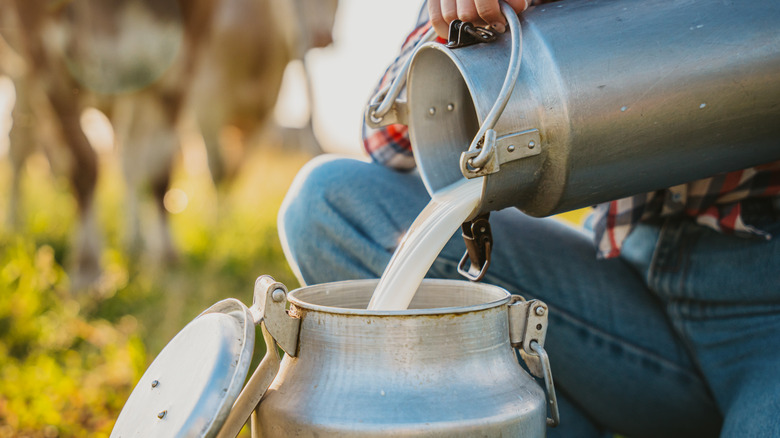Buying Raw Milk Is Now Legal In Iowa, But There's A Catch
While there are many types of milk on the shelf, Iowans have another bottle that can be purchased at select locations. At the store, dairy milk is pasteurized, meaning the liquid has been heated in order to remove potentially harmful bacteria. Raw milk has not gone through that process. Recently, Iowa passed a bill allowing limited sales of raw milk to consumers as of July 1. Signed into law by Governor Kim Reynolds, the legislation allows farms to offer direct-to-consumer raw milk sales. It does not permit sales at farmers' markets, grocery stores, or other off-farm options. In addition, the containers of raw milk must provide consumption warning labels.
The legislation was opposed by both the Iowa State Dairy Association and Iowa Dairy Foods Association, per Iowa Public Radio. Although the participating farms would have to submit to farm testing, the organizations believe that the potential health harm outweighs the benefits. The side effects from drinking raw milk come from ingesting bacteria including Salmonella, E. coli, and Listeria, which are causes of food-borne illness. Specifically, the opposition believes that the raw milk regulation is more lenient than the safety oversight on other dairy manufacturers. Even though there is a limited seven-day selling window, some organizations worry that the potential public health risk should not be taken lightly. Although everyone is encouraged to do their own due diligence, some Iowans will be traveling to the farm to purchase that bottle of raw milk in the near future.
How many states allow the sale of raw milk?
The phrase "Got Milk" may have evolved in recent years, but one aspect might be taken for granted in that conversation. Thanks to Louis Pasteur's scientific concept of heating food, aka pasteurization, food for mass consumption became safer. While the natural food movement questions the methodology's impact on nutritional benefits, some people are looking to incorporate raw food into their diets. As Iowa is the next state to allow limited sales of raw milk, other states offer similar beverage choices.
In 1987, the Food and Drug Administration prohibited the interstate sales of raw milk, i.e. milk that has not be pasteurized. While that federal law is still enforced, states can implement their own legislation. According to A Campaign for Real Milk, 12 states allow retail sales of raw milk. 20 states, which now includes Iowa, allow on-farm sales. Only Nevada prohibits all sales of raw milk.
Although consumers will debate the nutritional benefits versus the health risks, it appears that there is a movement towards making raw milk available under certain circumstances. Whether it is consumer demand, farmers' choice, or something else remains to be seen. Given the evolving conversation on what is or is not considered milk, there is another chapter to be added and it is a topic that will always have some heat involved in it.

